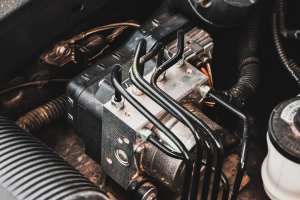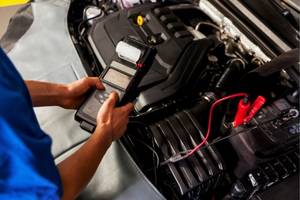Introduction
Imagine you are traveling down the highway, and suddenly, your vehicle starts behaving strangely. The engine hesitates, the acceleration is inactive, and warning lights are flashing on the dashboard. You're left scratching your head, wondering what could be causing these issues. Often, the culprit is the Engine Control Unit (ECU) - the vehicle's brain that manages major functions such as fuel injection, ignition timing, and idle speed. Understanding the causes of ECU failure is essential to maintaining your vehicle's performance and avoiding those stressful roadside breakdowns. In this article, we'll dive into the common causes of ECU failure, its impact on vehicle performance, and preventive measures to keep your ECU in top shape.
Well, you're in luck because we're about to dive right into that. But before we get into the essentials, let's get familiar with our main protagonist—the ECU.
1. Identify the ECU: Role and Importance
The Engine Control Unit (ECU), often dubbed as the vehicle's brain, is the electronic powerhouse that looks after a variety of functions. The ECU is like the conductor of your vehicle's symphony orchestra, ensuring every part plays in harmony.
So, what does the ECU do? It's responsible for:
Fuel injection: The ECU calculates just the right amount of fuel your engine needs for ideal performance. Too much or too little can lead to problems like reduced fuel economy or damaging the engine.
Ignition timing: The ECU also decides when to fire the spark plugs. This is important for smooth engine operation. Get the timing wrong, and you'll feel like you're riding an uncontrollable horse instead of a smooth machine.
Idle speed: Ever wonder how your car engine keeps running even when you're stuck in traffic, foot off the gas? That's the ECU maintaining the idle speed.
From this, it's clear that the ECU is a pretty big deal. Without it, your vehicle would be a metal box with wheels—unable to do much else. So, when you ask "what causes ECU failure?" you're really asking: "how can I keep my car running smoothly?"
Stay tuned as we delve deeper into common causes of ECU failure in our next section!
2. Common Causes of ECU Failure
Now that we've understood the importance of the ECU, let's dive into the factors that could lead to its failure.
Water Damage
Ironically, one of the leading causes of ECU failure lies not within the vehicle, but outside of it. As the old saying goes, "Water and electronics don't mix"—and the ECU is no exception. Water damage can happen in several ways, such as:
- Driving through a deep pool or a flooded street.
- A leaky seal allowing rainwater to drain in.
- Spilling a drink within the vehicle.
These seemingly harmless actions can lead to a short circuit in the ECU, causing it to fail.
Voltage Overload
Another common cause of ECU failure is voltage overload. This happens when the ECU receives more voltage than it’s designed to handle. It could be due to a faulty alternator or a poorly executed jump start. The excess voltage can fry the ECU's circuits, leading to its failure.
Old Age and Heat
Over time, wear and tear can also lead to ECU failure. Heat is an ECU's enemy. Extended exposure to high temperatures (like in a hot engine bay) can degrade the ECU's components and circuitry. This, combined with the inevitable toll of time, can cause the ECU to fail.
In our next section, we'll explore how these issues impact your vehicle's performance. So, if you've ever wondered, "What's the effect of ECU failure on my ride?"—keep reading!
So, your ECU is acting up. You may be wondering, "How does this affect my daily drive?" Let's get into the nitty-gritty of what ECU failure means for you and your vehicle.
Erratic Engine Behavior
First off, erratic engine behavior. The ECU serves as the brain of your vehicle, controlling and coordinating the functioning of your engine. When the ECU malfunctions, this control goes chaotic. You might experience unexpected stalling, poor fuel economy, or even a complete engine shutdown. It's like your car has a mind of its own—just not in a cool, "Knight Rider" kind of way.
Unresponsive Controls
Second, there's the issue of unresponsive controls. An ECU failure can cause your accelerator, brakes, or gear shifts to respond slower than usual. This slowness can turn a routine drive into a frustrating (and potentially dangerous) ordeal.
Warning Lights Galore
Finally, ECU failure often triggers a light show on your dashboard. If your 'Check Engine' or other warning lights are on, it can indicate something is wrong with the ECU. The problem here is that these lights can also indicate other issues, making it tough to spot an ECU failure as the culprit.
In the next section, we'll look at some proactive steps you can take to prevent ECU failure. Because, while we all like a good mystery, guessing "what causes ECU failure?" isn't the kind of riddle any of us enjoy solving.
4. Preventive Measures to Avoid ECU Failure
Now that we've explored the impacts of ECU failure, let's talk about solutions. Because the best way to deal with ECU failure, like any other vehicle problem, is to prevent it in the first place.
Regular Check-ups
Regular check-ups are key. Like going to the doctor for an annual physical, your vehicle benefits from regular estimations. You can catch a potential ECU problem before it becomes a full-blown ECU failure. It is the preventative approach to answering "what causes ECU failure?"
Quality Parts and Repairs
Next up, always opt for quality parts and repairs. We all love a good bargain, but when it comes to your vehicle's ECU, the cheaper option might end up costing you more in the long run. Quality parts can resist the test of time and resist issues that could lead to ECU failure.
Proper Vehicle Maintenance
Lastly, proper vehicle maintenance goes a long way. Regular oil changes, timely tune-ups, keeping your vehicle clean—these might seem very small tasks, but they add up. A well-maintained vehicle is less likely to face ECU issues.
By following these steps, you're not just maintaining your vehicle—you're also saving yourself from the headache of diagnosing "what causes ECU failure?" down the line. Prevention, as they say, is better than cure. And your vehicle will thank you for it.
Conclusion
In summary, the ECU is an important component of your vehicle, ensuring smooth operation and optimal performance. However, it is open to failure due to factors such as water damage, voltage overload, and the wear and tear associated with age and heat. Identifying the symptoms of ECU failure, understanding its impact, and taking preventive measures can help you avoid expensive repairs and maintain a reliable vehicle. Regular check-ups, using quality parts, and proper maintenance are key strategies to keep your ECU functioning properly. By being proactive, you can increase the life of your ECU and enjoy a smoother, more dependable driving experience.
FAQs on
What Causes of ECU Failure in 2025 : Understanding and Preventing Common Issues
-
1. What is the ECU and why is it important?
Ans.
The Engine Control Unit (ECU) is the electronic brain of your vehicle that regulates key functions such as fuel injection, ignition timing, and idle speed. It ensures your engine runs efficiently and smoothly.
-
2. What are the common causes of ECU failure?
Ans.
Common causes of ECU failure include water damage, voltage overload, and long-term exposure to heat and wear. These factors can lead to short circuits, fried circuits, and degraded components.
-
3. How does ECU failure affect my vehicle's performance?
Ans.
ECU failure can result in unpredictable engine behavior, unresponsive controls, and multiple warning lights on the dashboard. These issues can make driving frustrating and potentially dangerous.
-
4. Can I prevent ECU failure?
Ans.
Yes, preventive measures such as regular vehicle check-ups, using quality parts and repairs, and maintaining proper vehicle maintenance can significantly reduce the risk of ECU failure.
-
5. What should I do if I suspect my ECU is failing?
Ans.
If you suspect ECU failure, it is best to take your vehicle to a professional mechanic for a thorough diagnosis and repair. Ignoring the problem can lead to more severe and costly issues.
-
6. ECU failure common in older vehicles?
Ans.
ECU failure is more common in older vehicles due to lengthy exposure to heat, wear and tear, and outdated technology. Regular maintenance and timely repairs can help reduce these risks.


